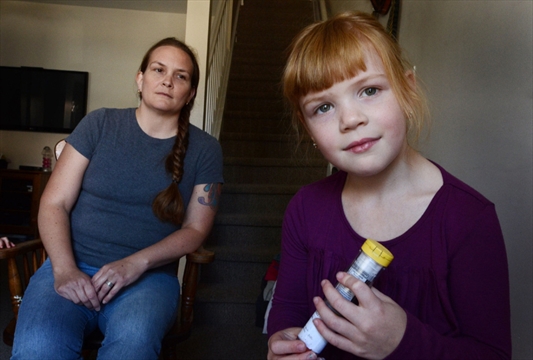Accommodating Allergies
"They left me no choice but to file a claim to get them to the table because I wasn't getting anywhere. I'm not looking for a guaranteed allergy-free environment because I know it's not possible. But reasonable accommodations that fall in line with our doctor's diagnosis is just plain common sense."
"...Bring to light the fact that children have the right to a barrier-free education. Anything short of that is discrimination."
Lynne Glover, mother of 6-year-old Elodie, Hamilton, Ontario
 |
| Hamilton Spectator; Lynne and Elodie Glover |
What mother is there on Planet Earth who will not fight tooth and nail for the well-being of her child?
To nurture the child, guide the child, ensure that no harm comes to the child. Mothers teach their children to have a care, to perform tasks that are meant to instruct and to keep safe. Also to be respectful of others, to look both ways when crossing a street, not to speak to strangers, to be kind and helpful, to accept that for a growing body to be healthy one must eat fruits, vegetables and dairy products.
Sorry: dairy products are out. Eggs as well. That is, when your life depends on their exclusion. As when a child is diagnosed with a severe allergy to milk products and to eggs. They are then withheld, the child learns to understand that these items will be uncategorically removed from their diet. And if there are other children in the family, to ensure that no cross-contamination occurs, or that inadvertently the allergic child is served a food with milk in it meant for a sibling, those foods are forbidden in the home.
So the children in that family -- and in the case of 6-year-old Elodie Glover, there are four other children -- are of necessity as their mother sees it, deprived of the normal quotient of eggs and milk products from their diet. Eggs and milk products are considered the most wholesome, nutritional constituents of a young, growing person's diet. So alternatives are found that do the next-best thing to ensure that children remain healthy.
The question is: should that apply of necessity to all children attending a school that little Elodie is a pupil within? The care and caution that a loving, concerned mother extends toward her vulnerable child must then be shared by the school administration and teaching staff. All the children at the school must have withheld from them through the school's snack program and their packed lunches the offending food items -- a situation of which all parents must be informed.
Initially the school at which Lynne Glover's other children receive their education, Holy Name of Jesus Catholic Elementary School, assured Ms. Glover that they would do everything it took to keep Elodie safe. Nonetheless the school, mindful of its responsibility to all the other children at the school, continued to operate its milk and snack program where puddings, yogurts and cheese were common fare in keeping with the recognition that these are all healthy food products for children.
In attempts to ensure that little Elodie did not encounter problems she was excluded from fun days and BBQs; while others ate chocolates on Valentine's Day, Elodie could not. She was "segregated" at lunch and snack time in kindergarten, and in Grade 1 had to sit at a separate table in the classroom while other children ate their cheese sandwiches and had their milk. Ms. Glover claims that one day her daughter's teacher had been eating buttered popcorn and Elodie returned home from school with shortness of breath and watery eyes.
The school has designated peanut and tree-nuts may not enter the school, given the prevalence of children suffering from more common allergies to these less important food items. "The vast majority of parents are finding ways to work with the schools and vice versa. It's unfortunate when these situations escalate", said Laurie Harada, executive director of Anaphylaxis Canada, of Ms. Glover's decision to lodge an official complaint with the Human Rights Tribunal.
Elodie has experienced nine anaphylactic reactions over her lifespan. Her mother has no wish to move her to another school. Ms. Glover feels that the school should be as milk-product-and-egg-free as it is peanut-and-tree-nut free to accommodate little Elonie. Ms. Glover is a stay-at-home mother for her five children. Perhaps it has never occurred to her to home-teach her vulnerable child rather than impose the child's condition on hundreds of other people which would result in depriving hundreds of children of healthy food.
Parents who would have to be provided with a list of appropriate food alternatives guaranteed not to induce anaphylactic reactions in one child of the school where their own children attend classes might not be too thrilled at having additional problems of accommodation foisted upon them by a mother insistent that the public sphere is the place where her child must be guaranteed safety. By depriving universal whole foods to children to assuage the entitlement of one mother on behalf of her child an uneven 'right' is assumed.
Where does personal responsibility stop and group responsibility step in? A matter of degrees, surely, not a matter of sacrificing hugely to pacify the angst of one woman who must deal with the health needs of a child requiring close attention. When is the imposition on the rights of others to a normal, healthy lifestyle considered to be enough of a compromise to entitled demands by others?
Labels: Child Welfare, Education, Health, Human Relations, Ontario

0 Comments:
Post a Comment
<< Home